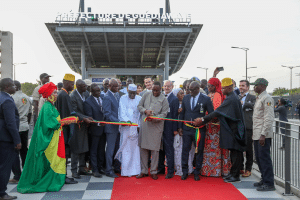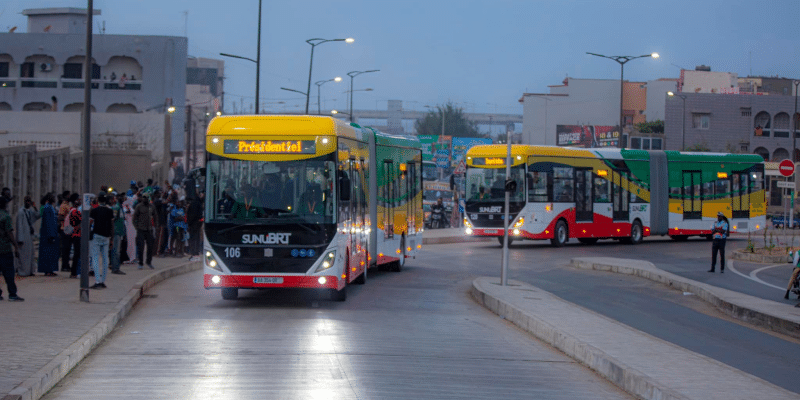The official images have been doing the rounds of the social networks since the evening of 15 January 2024. The solar-powered Bus Rapid Transit (BRT) network is now operational in Senegal, three years after the project was launched. The aim is to relieve congestion in Dakar, which loses 152 million dollars a year to traffic jams.
While Sundays are often quiet and restful for many families in Senegal, 15 January was an exception. The Bus Rapid Transit (BRT), designed to serve 300,000 passengers in the city of Dakar, went into service. In all, 121 fully electric buses delivered by the Chinese transport equipment company CRRC Corporation.
At the ceremony, which was attended by local residents, elected representatives and business leaders, the Executive Council for Sustainable Urban Transport (Cetud) who led the project, pointed out that these public transport vehicles would be travelling on 18.3 km of reserved and upgraded lanes, serving 14 councils with 23 stops. Now, as planned from the launch of the project in 2021, the Senegalese capital will be relieved of traffic congestion and linked to the coastal town of Guédiawaye.

Inauguration of the BRT network on the Place de la Nation in Dakar © Presidency of the Republic of Senegal
This is a source of pride not only for the 3.8 million Dakar residents, who will be able to make shorter journeys (45 minutes instead of 90 minutes for the line mentioned above), but also for environmentalists in this West African country, who have long advocated sustainable modes of transport. The Dakar BRT, developed by the French industrial group Meridiam (concession holder for the network), is an alternative to diesel and is expected to reduce emissions by 59,000 tonnes of CO2 equivalent per year.
Read also- SENEGAL: the Dakar Express Train, a lifeline for sustainable transport
As a reminder, the investment cost of this project amounts to 419 billion CFA francs (680 million euros), with the participation of the World Bank, the European Investment Bank (EIB) and the Green Climate Fund (GCF). According to Macky Sall, there is no question of neglecting its operation and maintenance. The Senegalese head of state also announced that La Teranga plans to “eventually acquire 158 new electric buses and a platform equipped with the latest generation technology to manage and monitor the entire system”.
Benoit-Ivan Wansi








You must be logged in to post a comment.